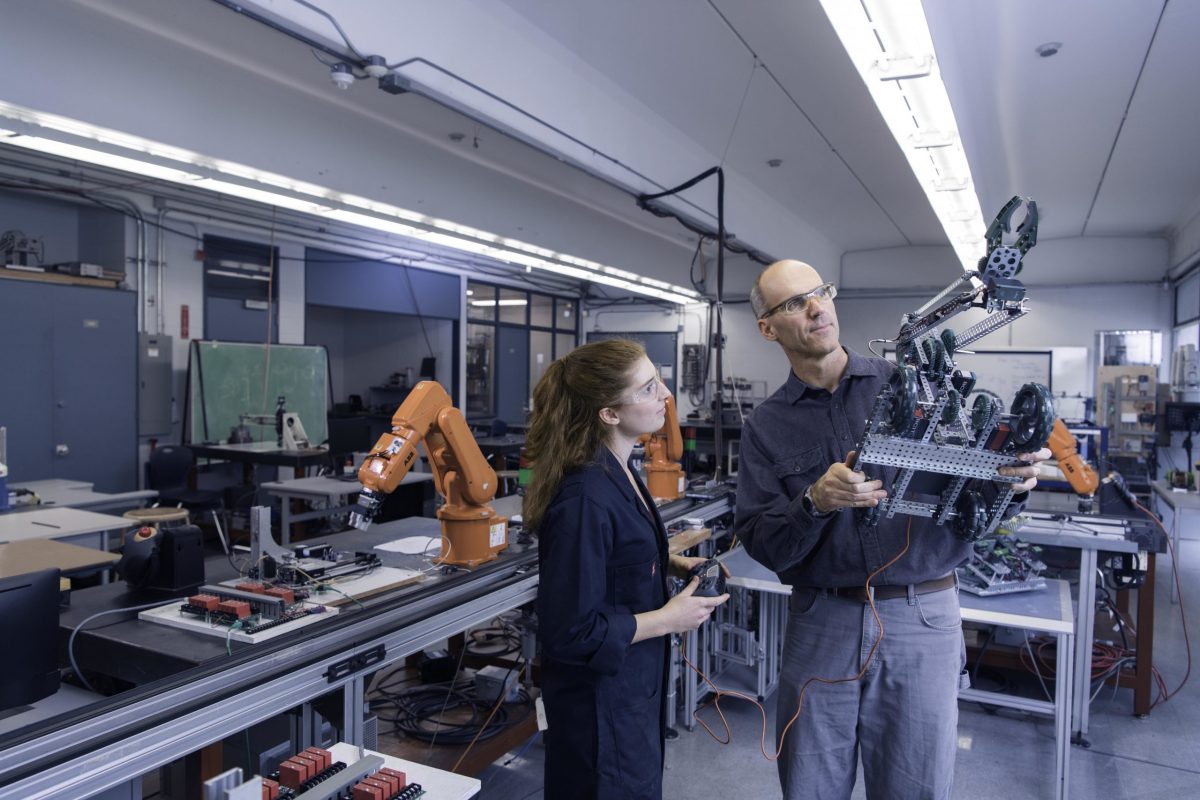
(Story updated in February 2025 to reflect tournament details for the 2025 VEX Robotics Competition at BCIT.)
In a rapidly evolving workforce where the use of artificial intelligence and robots are changing how we work, new job and career opportunities related to science, technology, engineering, and math (STEM) fields are also emerging, alongside the growing demand for professionals from diverse backgrounds to fill STEM-related jobs. Ensuring students have early exposure to STEM education, such as through robotics competitions, is critical in building a diverse and skilled workforce to support STEM jobs of the future.
Each year, BCIT hosts the VEX Robotics Regional Championship Competition at the Burnaby Campus gymnasium – the competition welcomes high school teams from across British Columbia (BC) to compete in an intense one-day robotics tournament.
The VEX Robotics Competition brings science, technology, engineering, and mathematics (STEM) skills to life by challenging high school students to design and build a robot to compete against other teams in a game-based engineering challenge. In three 12 feet by 12 feet battlefields, teams will put their custom-built robots to the test in a fast-paced, round-robin competition. This year’s challenge tasks students with placing mobile goals, scoring rings on the goals, and climbing.
Following an intense day of competition, BCIT Mechanical Engineering faculty Autumn Friesen, along with a panel of judges, will announce the winning team who will take home the BC Regional Championship and advance to the VEX Robotics Competition World Championship in Dallas, Texas, in May 2025.
The lasting impact of an early introduction to STEM
When you hear the word ‘competition,’ robotics may not be the first thing that comes to mind. The fact is though, robotics competition for high school students have become more prevalent over the years to inspire future generations of STEM leaders and innovators.
BCIT Mechanical Engineering faculty Autumn Friesen is a testament to VEX Robotic competition’s finding that 95% of participants reported an increased interest in STEM subject areas and pursuing STEM-related careers.
Autumn’s passion for robotics began over a decade ago when they founded their high school’s robotics team. They credit their interest in robotics to their Computing teacher at Seaquam Secondary.
“Since I was so far ahead in the Computing class, I got to be alone in the back to explore with the VEX robotics kit, and eventually started a team and went to competitions,” says Autumn.
They later enrolled in the BCIT Mechatronics and Robotics program, and says it was a natural decision at the time. “I already knew I liked robotics, and honestly, the program just sounded really cool,” says Autumn. “I also liked the smaller class sizes and shorter program length, so it seemed like a no-brainer.”
Autumn now teaches in both the Mechatronics and Robotics and Mechanical Engineering programs, but says they didn’t foresee becoming a BCIT instructor, at least not so soon.
“I’ve joked that I’m doing my career in reverse, starting out with teaching, and maybe going back into industry at some point,” says Autumn. “Or I might just stay here at BCIT, I am really enjoying it after all.”
Inspiring and building a diverse generation of leaders in STEM
Although Autumn hasn’t competed in quite some time, they’ll be in the thick of the action as they host the upcoming VEX Robotics Competition’s Regional Championship at BCIT. Autumn says VEX Robotics competitions provide opportunities for students to acquire in-demand skills in a hands-on environment.
“It’s one thing to learn about robotics in a classroom or on a computer, but it really is different to design and build a machine. The competitions also foster the development of soft skills like communication, problem solving, leadership, collaboration, and time management – in a fun and engaging way.”
They add, “It’s also a great way to create an inclusive and supportive environment for diverse students to explore opportunities in STEM, particularly those in underrepresented groups.” “Many students who have an early exposure to STEM education often end up pursuing those careers once they reach post-secondary.”
BCIT has hosted the annual VEX robotics competitions for more than 15 years, and is the only post-secondary institute in BC to regularly host a major robotics competition. Autumn hopes participation in robotics competition will continue to inspire young students to further their education, as well as to become future innovators and leaders in STEM.
Preparing students for cutting-edge and high demand careers
The BCIT Mechatronics and Robotics program offers students a unique combination of courses that blend knowledge in electronics, mechanics, and computer programming. Students are taught the theory and practical skills needed to design and build equipment used in filmmaking, medical devices, autonomous vehicles, and more.
Autumn says students learn the fundamental concepts like electronics, math, and physics, but the real skill building takes place in hands-on situations.
“The program is designed to show students how to build a system from the ground up. We’re emphasizing real systems building and real troubleshooting, and employers really appreciate this.”
They also explain that troubleshooting is one of the most valuable skillsets students learn, and the same was true back when they were in the program.
“When I would apply for work terms in between semesters during my degree after the program, companies were routinely impressed with my troubleshooting abilities I learned at BCIT,” says Autumn. “It’s something every graduate from the program is able to do, and it’s why they continually get hired into great jobs.”
Autumn’s advice for anyone thinking of applying to the Mechatronics and Robotics program is to check out the program at Open House or the Project Expo to really see what we’re all about.
“Doing the spend a day program with us is also a ton of fun. We are more than happy to show off all the cool things this program has to offer. Myself and the other Mechatronics faculty are passionate about the program as we’re all graduates of the program ourselves and really believe this is one of the best programs BCIT has to offer,” shares Autumn.
The upcoming 2025 VEX Robotics Regional Championship Competition takes place on March 1, from 9 am – 6 pm, in the BCIT Burnaby Campus gymnasium (Building SE16). Members of the public are welcome to attend and spectate.
Note to media: If you are interested in interviewing Autumn Friesen, BCIT Mechanical Engineering faculty, please contact Amy Chen, 778-384-7245.
